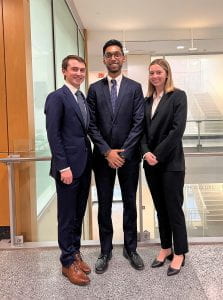This guest blog post is written by Ameen Iraqi, a GW senior studying Business Administration with concentrations in both Finance and International Business. The GW Investment Institute partnered with the Office of Undergraduate Programs for this competition. Thank you to all who were involved!

I am honored and grateful for the opportunity to represent The George Washington University (GW) and the GW Investment Institute at the McGill International Portfolio Challenge (MIPC). MIPC is the world’s premier buy-side finance competition, with universities competing from across the globe to address a pressing issue in the world of finance.
This year’s case centered on transitioning a fictional Australian pension fund/superannuation fund, to net-zero (greenhouse gas emissions) by 2050 and clearly outlining how to achieve this ambitious goal. I partnered with GW students Rhys Chambers (SEAS ‘25) and Will Ahrens (GWSB ‘25). Collectively, we directed our efforts to thoroughly researching existing superannuation strategies to integrate environmental, social, and governance (ESG) into investment decision-making. Major industry shortcomings existed in comprehensive ESG-tracking for real assets and private equity. Our approach combined quantitative climactic and qualitative investment analyses to guide our strategy in directing the superannuation to achieve a 2050 net-zero target.
In creating our proposal and presentation, we conducted rigorous research and analysis on the sustainable investing space, learning how to specifically bridge the gap between ambitious climate goals and a lack of transparency. Reaching out to GW alumni and professionals in the industry offered us a unique perspective in tackling this issue to lead the change to a future net-zero world.
The GW Investment Institute was instrumental in providing our team with the necessary resources to compete with top universities around the world, as well as providing insightful and critical feedback to ensure we remained competitive. Through our participation in this year’s MIPC competition, we learned that the effort to make investing sustainable is one that requires deep analytical thought that approaches the issue from a current and future perspective. We also learned that it is crucially important to collaborate with stakeholders being represented and coordinating this effort with other leaders around the world. We hope our work in this year’s competition can serve as a source of inspiration for students and professionals alike so that we may work in unison to achieve ambitious financial and climactic goals in the coming years.
2022 McGill International Portfolio Challenge Overview
The central goal of our strategy relied on reducing current emissions while also planning our portfolio for a future net-zero world. Further, we noticed a significant disconnect between institutional strategies and existing climate efforts, such as the Paris Climate Agreement. Seeing this, our proposal aimed to bridge the gap between existing climate commitments and institutional approaches to achieving net-zero emissions.
With such a large task at hand, we redefined our investment mandate to maximize risk-adjusted climate-aware returns at low management fees. Redefining our investment mandate at the onset gave us the opportunity to optimize our portfolio while mitigating future investment, climate, and transition risks. We also introduced a comprehensive timeline with five-year intervals to ensure our proposal was Paris-aligned. Furthermore, we employed a data-driven approach to layer in key investment themes to develop an asset-class approach, tailoring our offerings to investors’ and their climate-related ambitions.
Through our proposal, we learned how intensive our approach needed to be in order to address climate change concerns, providing a clear outline through every step of the process. We also found tremendous value in evaluating the sustainable investing industry holistically, evaluating where competing superannuations stood in terms of their emissions reduction plans. Further, we hoped to address investors’ concerns with how a climate-aware portfolio may achieve greater returns than a traditional portfolio. While difficult to sway those most opposed to climate-aware investing, we sought to create options which would benefit all stakeholders and maintain a positive impact on local communities.
Despite our progressive investments, our biggest obstacle was completely reaching net-zero, so we maintained a focus on offsetting remaining emissions. Analyzing Australia’s National Inventory Reports, we determined the Land Use and Change and Forestry sub-sector would be the most beneficial in offsetting our remaining emissions. We sought to invest in reforestation and carbon capture and storage techniques, along with investing directly in farmers who are using regenerative agriculture methods to create carbon sinks, and investing in carbon credits through a third party.
Again, we hope our work in this year’s competition may serve as a source of inspiration for future teams as they compete in future competitions.
